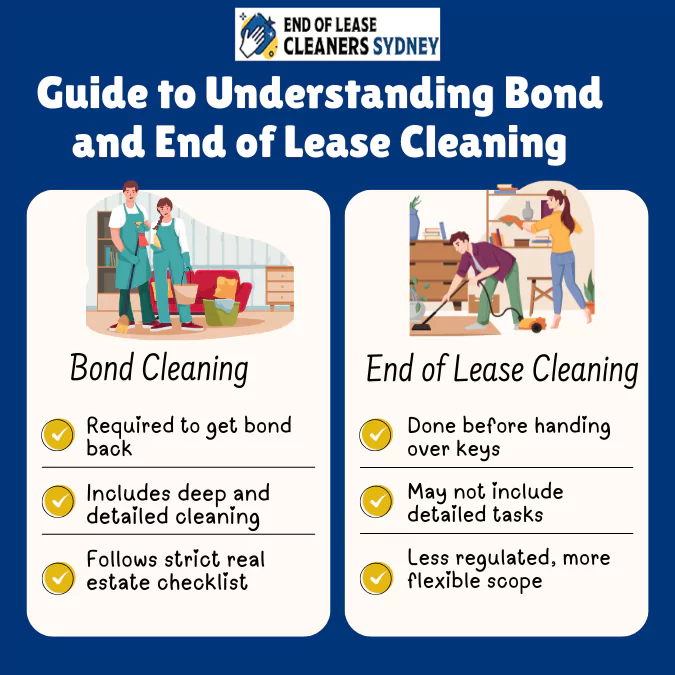If you've ever moved out of a rental property then you've likely heard terms like bond cleaning, end of lease cleaning, or vacate cleaning. They all sound slightly different, but they all relate to the same meticulous cleaning process that take place when renters leave a rental home. The distinction is primarily in the terminology used across states and by different real estate agents.
In Queensland regions like the Gold Coast and Sunshine Coast, people commonly say bond cleaning. In New South Wales, particularly in Sydney, the phrase end of lease cleaning is widely used. Meanwhile, in Perth, the term vacate cleaning often comes into play.
So, does this mean that bond cleaning and end of lease cleaning are completely different? Not really. The terms are used interchangeably but the expectations of landlords or property managers, may differ slightly based on local practices. This article explains the difference between bond cleaning and end of lease cleaning. At its core, both refer to a comprehensive cleaning service that helps tenants in obtaining their bond money and guarantees the property is in perfect shape for the next tenant.
- What is Bond Cleaning and End of Lease Cleaning?
- The Purpose Behind Bond Cleaning and End of Lease Cleaning
- Inclusions in the Cleaning Process
- Common Mistakes Tenants Make During End of Lease Cleaning
- Professional Cleaning vs DIY: Which Works Best
- Infographic: Guide to Understanding Bond and End of Lease Cleaning
- Wrapping Up
1. What is Bond Cleaning and End of Lease Cleaning?
Bond cleaning and end of lease cleaning, are essentially the same service, but described differently depending on the location. Both include a thorough cleaning of a rental home, before the tenant returns the keys. The goal is to restore the property to as close to its original state as possible, taking into consideration normal wear and tear.
In Sydney, tenants and landlords generally refer to it as end of lease cleaning. In Queensland, however, the term bond cleaning prevails, reflecting the connection with the rental bond that a renter pays at the start of the lease. Regardless of the term, the process include scrubbing, dusting, and polishing every inch of the house, from carpets and kitchens to bathrooms and outdoor spaces.
2. The Purpose Behind Bond Cleaning and End of Lease Cleaning
The primary goal of both bond cleaning and end of lease cleaning is, to guarantee that tenants follow the cleaning standards outlined in their lease agreement. When renters vacate, landlords and property managers undertake inspections to verify that the property is clean and ready for the next tenant. If the residence fails the inspection, a portion of the rental bond may be withheld to cover professional cleaning fees.
A thorough cleaning not only helps tenants get their bond back but also maintains a positive rental history, which can be useful when applying for future rentals. For landlords and real estate agents: it ensures that the property is in good shape, shortens vacancy periods and swiftly attracts new tenants. This is why professional services for budget end of lease cleaning Sydney are so popular.
3. Inclusions in the Cleaning Process

Whether you call it bond cleaning or end of lease cleaning, the inclusions are nearly same. Professional cleaners adhere to, a strict checklist that includes all important areas of the property. This usually includes:
- Deep cleaning kitchens, including ovens, stovetops, and range hoods
- Scrubbing bathrooms, toilets, and tiles
- Vacuuming and steam cleaning carpets
- Dusting blinds, light fittings and ceiling fans
- Wiping down walls, doors, and skirting boards
- Cleaning windows, mirrors, and glass surfaces
- Sweeping and mopping hard floors
Some services may include optional extras such as pest control or lawn upkeep, depending on the landlord's expectations and the property's condition. The complicated structure of these inclusions makes the operation far more involved than a weekly cleaning.
4. Common Mistakes Tenants Make During End of Lease Cleaning
One of the most typical mistakes tenants make is underestimating the scope of the bond or end of lease cleaning. Many people believe that a general tidy up is sufficient, but landlords expect a complete, professional clean. Missing details such as dirty oven trays, mould in grout lines, or dust behind appliances can cause arguments during the final inspection.
Another mistake is postponing cleaning until the last minute. Moving is stressful, and with packing, paperwork, and removalists to keep up with, cleaning can often feel rushed. Because it saves time and lowers the possibility of losing their bond money due to overlooked details many renters choose to employ specialists for, end of lease cleaning Sydney.
5. Professional Cleaning vs DIY: Which Works Best?
Tenants usually find it difficult to decide whether to conduct their own cleaning or hire professional cleaners. On the surface, a DIY clean appears to be less expensive but it requires a significant amount of time, effort and attention to detail. Tenants must follow strict inspection requirements and even little things like dusty drapes or oven stains might result in the loss of a portion of their bond.
Professional bond or end of lease cleaners, on the other hand are equipped with industry standard instruments, and a strict checklist that meets landlord requirements. Many companies also include a bond back guarantee, which means they will return to rectify any missed areas if the property management is dissatisfied. For Sydney tenants this can be a stress free method to guarantee that their end of lease cleaning obligations are satisfied without having to panic at the last minute.
Infographic: Guide to Understanding Bond and End of Lease Cleaning

Wrapping Up
So, is there really a difference between bond cleaning and end of lease cleaning? The answer is no. The process and expectations are practically identical, with only regional terminology setting them apart. If you are leaving a rental house in Sydney keep in mind that professional end of lease cleaning services are tailored to fulfil the high expectations of local landlords and brokers. By avoiding common mistakes, you can make your relocation less stressful and keep your bond intact.